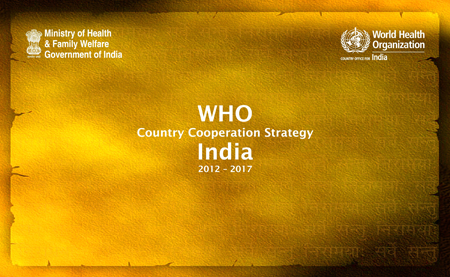|

Envisioning
better health for all Indians, Mr Ghulam Nabi Azad, the Hon’ble Minister for Health & Family Welfare,
Government of India launched WHO’s new Country Cooperation
Strategy with India
(2012-17) along with Dr Nata Menabde, WHO Representative to India on 29 June 2012.
Present
at the launch were Mr P K Pradhan, Secretary, Ministry of Health & Family
Welfare (MoHFW); Mr K Desiraju,
Special Secretary (Health Administration), MoHFW;
and development partners including representatives from other UN agencies,
World Bank, USAID, CDC, Norway India Partnership Initiative and Rotary
International.
Reflecting
the shared vision of the two partners, it is for the first time that the
Country Cooperation Strategy (CCS) has been developed jointly by the Ministry of Health and Family Welfare (MoHFW),
Government of India and the WHO Country Office for India (WCO).
The
key aim of this path-breaking strategy is to contribute to improving health
and equity in India.
It also provides the blueprint for unleashing India’s role on the global health
arena alongside the continued pursuit of health improvement in the country.
In this context, it distinguishes and addresses the challenges to India’s
potential globally as well as impediments in solving long-standing health and
health service delivery internally.
To
contribute meaningfully to the national health policy processes and
government’s health agenda, the CCS identifies three strategic priorities and
the focus areas under each priority:
Supporting
an improved role of the Government of India in global health
· International
Health Regulations: Ensuring the implementation of International
Health Regulations and similar commitments
· Pharmaceuticals:
Strengthening the pharmaceutical sector including drug regulatory capacity
and, trade and health
· Stewardship:
Improving the stewardship capacity of the entire Indian health system
Promoting
access to and utilization of affordable, efficiently networked and
sustainable quality services by the entire population
· Financial
Protection: Providing universal health service coverage so
that every individual would achieve health gain from a health intervention
when needed
· Quality:
Properly accrediting service delivery institutions (primary health care
facilities and hospitals) to deliver the agreed service package
Helping
to confront the new epidemiological reality of India
· Health
of Mothers and Children: Scaling up reproductive, maternal,
newborn, child and adolescent health services
· Combined
Morbidity: Addressing increased combinations of
communicable and non-communicable diseases
· Transitioning
Services: Gradual, phased “transfer strategy” of WHO
services to the national, state and local authorities without erosion of
effectiveness during the transition period
Incorporating
valuable recommendations of key stakeholders, the CCS balances country
priorities with WHO’s strategic orientation of
contributing optimally to national health and health systems
development. It includes
a number of inter-sectoral actions on the broad
determinants of health as well as necessary health system reforms for
providing better services to individuals and communities, and jointly
achieving greater health impact.
Aligned
closely to the ongoing WHO reforms, this new CCS also marks a transition in
terms of how WCO plans, works, organizes itself and delivers measurable
results towards the goal of ensuring better health for all Indians in
collaboration with the Government and other partners.
The
CCS implementation will be based on two-year Action Plans developed by the
WCO in consultation with the MoHFW taking due
consideration of the health priorities envisaged by the 12th Five
Year Plan.
|